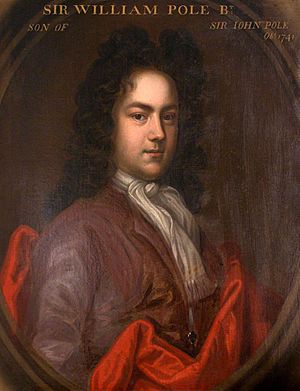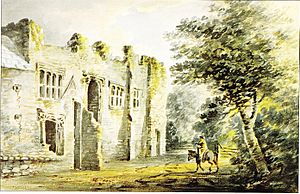Sir William Pole, 4th Baronet facts for kids
Sir William Pole, 4th Baronet (born 1678 – died 31 December 1741) was an important English landowner and politician. He lived at Colcombe Castle near Colyton and Shute in Devon. Sir William was a member of the Tory Party and served in the English House of Commons and later the House of Commons of Great Britain from 1701 to 1734. A Baronet is a special title, like a knight, that can be passed down through a family.
Contents
Early Life & Family Background
William Pole was the oldest son of Sir John Pole, 3rd Baronet, who was also a Member of Parliament (MP). His mother was Anne Morice. Her father was Sir William Morice, who was also an MP.
William Pole started his studies at New College, Oxford on 7 July 1696, when he was 18 years old. He became the 4th Baronet in 1708 after his father passed away.
Political Career in Parliament
Sir William Pole had a long career in the British Parliament. He was known for being a strong supporter of the Tory party.
First Steps in Politics
In 1701, Sir William was first elected as a Member of Parliament (MP) for Newport. He won this election without anyone running against him. This was because his mother's family, the Morices, were very influential in that area.
In 1702, he supported a motion to defend the actions of the House of Commons. This showed his loyalty to his party.
Active Years as an MP
Sir William became an MP for Camelford in 1704. He was very active in Parliament during this time. He often acted as a "teller" for the Tories, which meant he helped count votes for his party. He also voted for something called "the Tack" in 1704.
In the 1705 election, he kept his seat in Camelford. He voted against the candidate supported by the King's court for the Speaker of the House.
Later Parliamentary Roles
In 1708, Sir William was again elected for Newport without opposition. He was less active in Parliament during this period. He became a founding member of a group called the "High Tory ‘Board of Brothers’." He also voted against the impeachment of Dr. Sacheverell, a famous case at the time.
He was elected MP for Devon in 1710. In 1712, he was given a special job as Master of the Household. This meant he helped manage the King's royal household. However, he lost the by-election that followed this appointment.
He was elected without opposition for Bossiney in 1713. When King George I came to the throne in 1714, Sir William lost his job in the royal household.
Final Years in Parliament
Sir William was elected MP for Honiton in 1716. He won this seat again in a close election in 1722. He was also elected for Newport in the same year.
He lost the election in Honiton in 1727, but he was later given the seat after a special review in 1731. He chose not to run for Parliament in 1734. Throughout his time in Parliament, he consistently voted against the government in power.
Personal Life
Sir William Pole married Elizabeth Warry. She was the daughter of Robert Warry of Shute, Devon. He mentioned her in his will, which he wrote in 1733. In his will, he also strongly advised his son never to become a Member of Parliament.
Sir William Pole passed away on 31 December 1741. He died from a condition described as "gout in his stomach." His son, John, inherited his title. Sir William also had a daughter.
Images for kids
 | Sharif Bey |
 | Hale Woodruff |
 | Richmond Barthé |
 | Purvis Young |





